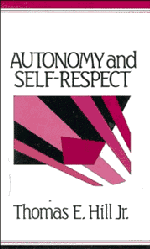Book contents
- Frontmatter
- Contents
- Sources and acknowledgments
- Introduction
- 1 Servility and self-respect
- 2 Self-respect reconsidered
- 3 Autonomy and benevolent lies
- 4 The importance of autonomy
- 5 Symbolic protest and calculated silence
- 6 Moral purity and the lesser evil
- 7 Self-regarding suicide: a modified Kantian view
- 8 Ideals of human excellence and preserving natural environments
- 9 Weakness of will and character
- 10 Promises to oneself
- 11 Social snobbery and human dignity
- 12 Pains and projects: justifying to oneself
- 13 The message of affirmative action
- Index
8 - Ideals of human excellence and preserving natural environments
Published online by Cambridge University Press: 05 June 2012
- Frontmatter
- Contents
- Sources and acknowledgments
- Introduction
- 1 Servility and self-respect
- 2 Self-respect reconsidered
- 3 Autonomy and benevolent lies
- 4 The importance of autonomy
- 5 Symbolic protest and calculated silence
- 6 Moral purity and the lesser evil
- 7 Self-regarding suicide: a modified Kantian view
- 8 Ideals of human excellence and preserving natural environments
- 9 Weakness of will and character
- 10 Promises to oneself
- 11 Social snobbery and human dignity
- 12 Pains and projects: justifying to oneself
- 13 The message of affirmative action
- Index
Summary
A wealthy eccentric bought a house in a neighborhood I know. The house was surrounded by a beautiful display of grass, plants, and flowers, and it was shaded by a huge old avocado tree. But the grass required cutting, the flowers needed tending, and the man wanted more sun. So he cut the whole lot down and covered the yard with asphalt. After all it was his property and he was not fond of plants.
It was a small operation, but it reminded me of the strip mining of large sections of the Appalachians. In both cases, of course, there were reasons for the destruction, and property rights could be cited as justification. But I could not help but wonder, “What sort of person would do a thing like that?”
Many Californians had a similar reaction when a recent governor defended the leveling of ancient redwood groves, reportedly saying, “If you have seen one redwood, you have seen them all.”
Incidents like these arouse the indignation of ardent environmentalists and leave even apolitical observers with some degree of moral discomfort. The reasons for these reactions are mostly obvious. Uprooting the natural environment robs both present and future generations of much potential use and enjoyment. Animals too depend on the environment; and even if one does not value animals for their own sakes, their potential utility for us is incalculable. Plants are needed, of course, to replenish the atmosphere quite aside from their aesthetic value.
- Type
- Chapter
- Information
- Autonomy and Self-Respect , pp. 104 - 117Publisher: Cambridge University PressPrint publication year: 1991
- 5
- Cited by



